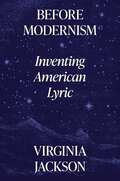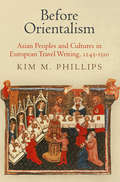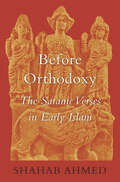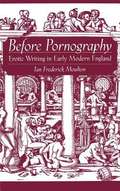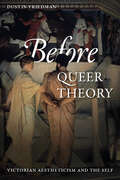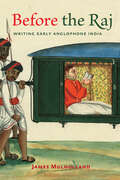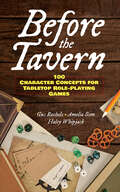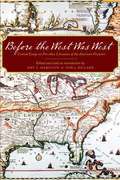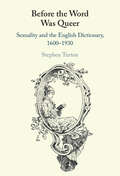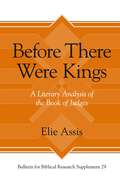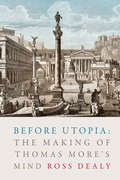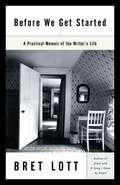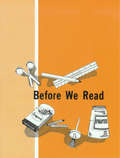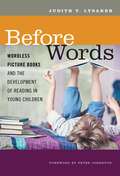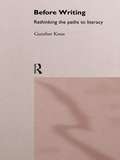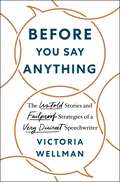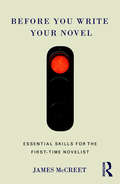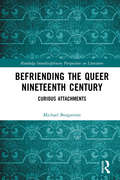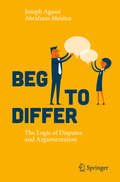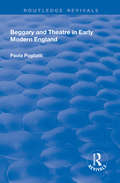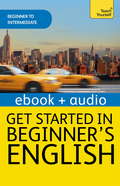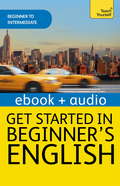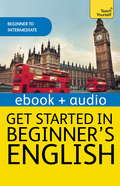- Table View
- List View
Before Modernism: Inventing American Lyric
by Virginia JacksonHow Black poets have charted the direction of American poetics for the past two centuriesBefore Modernism examines how Black poetics, in antagonism with White poetics in the late eighteenth and early nineteenth centuries, produced the conditions for the invention of modern American poetry. Through inspired readings of the poetry of Phillis Wheatley Peters, George Moses Horton, Ann Plato, James Monroe Whitfield, and Frances Ellen Watkins Harper—as well as the poetry of neglected but once popular White poets William Cullen Bryant and Henry Wadsworth Longfellow—Virginia Jackson demonstrates how Black poets inspired the direction that American poetics has taken for the past two centuries. As an idea of poetry based on genres of poems such as ballads, elegies, odes, hymns, drinking songs, and epistles gave way to an idea of poetry based on genres of people—Black, White, male, female, Indigenous—almost all poetry became lyric poetry. Jackson traces the twisted paths leading to our current understanding of lyric, along the way presenting not only a new history but a new theory of American poetry.A major reassessment of the origins and development of American poetics, Before Modernism argues against a literary critical narrative that links American modernism directly to British or European Romanticism, emphasizing instead the many ways in which early Black poets intervened by inventing what Wheatley called “the deep design” of American lyric.
Before Orientalism
by Kim M. PhillipsA distinct European perspective on Asia emerged in the late Middle Ages. Early reports of a homogeneous "India" of marvels and monsters gave way to accounts written by medieval travelers that indulged readers' curiosity about far-flung landscapes and cultures without exhibiting the attitudes evident in the later writings of aspiring imperialists. Mining the accounts of more than twenty Europeans who made--or claimed to have made--journeys to Mongolia, China, India, Sri Lanka, and Southeast Asia between the mid-thirteenth and early sixteenth centuries, Kim Phillips reconstructs a medieval European vision of Asia that was by turns critical, neutral, and admiring.In offering a cultural history of the encounter between medieval Latin Christians and the distant East, Before Orientalism reveals how Europeans' prevailing preoccupations with food and eating habits, gender roles, sexualities, civility, and the foreign body helped shape their perceptions of Asian peoples and societies. Phillips gives particular attention to the texts' known or likely audiences, the cultural settings within which they found a foothold, and the broader impact of their descriptions, while also considering the motivations of their writers. She reveals in rich detail responses from European travelers that ranged from pragmatism to wonder. Fear of military might, admiration for high standards of civic life and court culture, and even delight in foreign magnificence rarely assumed the kind of secular Eurocentric superiority that would later characterize Orientalism. Placing medieval writing on the East in the context of an emergent "Europe" whose explorers sought to learn more than to rule, Before Orientalism complicates our understanding of medieval attitudes toward the foreign.
Before Orthodoxy: The Satanic Verses in Early Islam
by Shahab Ahmed“The most systematic, critical study of an especially important tradition from early Islamic history, the so-called incident of the Satanic verses.” —ChoiceOne of the most controversial episodes in the life of the Prophet Muhammad concerns an incident in which he allegedly mistook words suggested by Satan as divine revelation. Known as the Satanic verses, these praises to the pagan deities contradict the Islamic belief that Allah is one and absolute. Muslims today?of all sects?deny that the incident of the Satanic verses took place. But as Shahab Ahmed explains, Muslims did not always hold this view.Before Orthodoxy wrestles with the question of how religions establish truth?especially religions such as Islam that lack a centralized authority to codify beliefs. Taking the now universally rejected incident of the Satanic verses as a case study in the formation of Islamic orthodoxy, Ahmed shows that early Muslims, circa 632 to 800 CE, held the exact opposite belief. For them, the Satanic verses were an established fact in the history of the Prophet. Ahmed offers a detailed account of the attitudes of Muslims to the Satanic verses in the first two centuries of Islam and traces the chains of transmission in the historical reports known as riwayah.Touching directly on the nature of Muhammad’s prophetic visions, the interpretation of the Satanic verses incident is a question of profound importance in Islam, one that plays a role in defining the limits of what Muslims may legitimately say and do?issues crucial to understanding the contemporary Islamic world.
Before Pornography: Erotic Writing In Early Modern England (Studies In The History Of Sexuality)
by Ian Frederick MoultonBefore Pornography explores the relationship between erotic writing, masculinity, and national identity in Renaissance England. Drawing on both manuscripts and printed texts, and incorporating insights from modern feminist theory and queer studies, the book argues that pornography is a historical phenomenon: while the representation of sexual activity exists in nearly all cultures, pornography does not. The book includes analyses of the social significance of eroticism in such canonical texts as Sidney's Defense of Poesy and Spenser's Faerie Queene.
Before Queer Theory: Victorian Aestheticism and the Self
by Dustin FriedmanA reimagining of how the aesthetic movement of the Victorian era ushered in modern queer theory.Late Victorian aesthetes were dedicated to the belief that an artwork's value derived solely from its beauty, rather than any moral or utilitarian purpose. Works by these queer artists have rarely been taken seriously as contributions to the theories of sexuality or aesthetics. But in Before Queer Theory, Dustin Friedman argues that aestheticism deploys its "art for art's sake" rhetoric to establish a nascent sense of sexual identity and community.Friedman makes the case for a claim rarely articulated in either Victorian or modern culture: that intellectually, creatively, and ethically, being queer can be an advantage not in spite but because of social hostility toward nonnormative desires. Showing how aesthetes—among them Walter Pater, Oscar Wilde, Vernon Lee, and Michael Field—harnessed the force that Georg Wilhelm Friedrich Hegel called "the negative," Friedman reveals how becoming self-aware of one's sexuality through art can be both liberating and affirming of humanity's capacity for subjective autonomy.Challenging one of the central precepts of modern queer theory—the notion that the heroic subject of Enlightenment thought is merely an effect of discourse and power—Friedman develops a new framework for understanding the relationship between desire and self-determination. He also articulates an innovative, queer notion of subjective autonomy that encourages reflecting critically on one's historical moment and envisioning new modes of seeing, thinking, and living that expand the boundaries of social and intellectual structures. Before Queer Theory is an audacious reimagining that will appeal to scholars with interests in Victorian studies, queer theory, gender and sexuality studies, and art history.
Before the Country
by Stephanie MckenzieIn the late 1960s and early 1970s, Canada witnessed an explosion in the production of literary works by Aboriginal writers, a development that some critics have called the Native Renaissance. In Before the Country, Stephanie McKenzie explores the extent to which this growing body of literature influenced non-Native Canadian writers and has been fundamental in shaping our search for a national mythology.In the context of Northrop Frye's theories of myth, and in light of the attempts of social critics and early anthologists to define Canada and Canadian literature, McKenzie discusses the ways in which our decidedly fractured sense of literary nationalism has set indigenous culture apart from the mainstream. She examines anew the aesthetics of Native Literature and, in a style that is creative as much as it is scholarly, McKenzie incorporates the principles of storytelling into the unfolding of her argument. This strategy not only enlivens her narrative, but also underscores the need for new theoretical strategies in the criticism of Aboriginal literatures. Before the Country invites us to engage in one such endeavour.
Before the Raj: Writing Early Anglophone India
by James MulhollandAnglo-India's regional literature was both a practical and imaginative response to a pivotal period in the early colonialism of South Asia.During the later decades of the eighteenth century, a rapid influx of English-speaking Europeans arrived in India with an interest in expanding the creation and distribution of anglophone literature. At the same time, a series of military, political, and economic successes for the British in Asia created the first global crisis to shepherd in an international system of national ideologies. In this study of colonial literary production, James Mulholland proposes that the East India Company was a central actor in the institutionalization of anglophone literary culture in India. The EIC drew its employees from around the British Isles, bringing together people with a wide variety of ethnic and national origins. Its cultural infrastructure expanded from presses and newspapers to poetry collections, letters, paper-making and selling, circulating libraries, and amateur theaters. Recovering this rich archive of documents and activities, Mulholland shows how regional reading and writing reflected the knotty geopolitical situation and the comingling of Anglo and Indian cultures at a moment when the subcontinent's colonial future was not yet clear. He shows why Anglo-Indian literary publics cohered during this period, reexamining the relationship between writing in English and imperial power in a way that moves beyond the easy correspondence of literature as an instrument of empire. Tracing regional and "translocal" links among Madras, Calcutta, Bombay, and settlements surrounding the Bay of Bengal, Before the Raj recovers a network of authors, reading publics, and corporate agents to demonstrate that anglophone literature adapted itself to geographical politics and social circumstances, rather than being simply imitative of the works produced in the English metropole.Mulholland introduces readers to figures like the Calcutta-born Eyles Irwin, the first man to sustain a literary career from India. We also meet James Romney, an army officer who wrote poems and plays, including a stage adaptation of Tristram Shandy. Alongside these men were anonymous female poets, hailed as the harbingers of an "anglo-asiatic taste," and captive adolescent Europeans who, caught up in the conflict with southern India's last independent ruler, Tipu Sultan, were forcibly converted to Islam, castrated, and made to cross-dress as "dancing boys" for Tipu's entertainment. Revealing the vibrant literary culture that existed long before the characters of Rudyard Kipling's best-known works, Before the Raj reveals how these writers operated within a web of colonial cities and trading outposts that borrowed from one another and produced vital interlinked aesthetics.
Before the Tavern: 100 Character Concepts for Tabletop Role-Playing Games
by Gus Rachels Amelia Som Haley WhipjackWho are you? Where did you come from before you entered the tavern? Explore a treasure trove of 100 compelling character concepts from the minds behind the TTRPG podcast Unprepared Casters. This collection is essential for tabletop role-playing game enthusiasts of all experience levels — from beginners who want to build captivating heroes and villains to veterans wading into uncharted waters. For Game Masters and writers, it's a wellspring of inspiration and a cure for writer's block. This compendium also includes a detailed guide to developing fascinating and unique adventurers, as well as tips on how to name characters. Engage in a world of storytelling possibilities with this dynamic backstory development guide and character creation tool. Concept pages are perforated for removal.
Before the West Was West: Critical Essays on Pre-1800 Literature of the American Frontiers
by Amy T. Hamilton Tom J. Hillard Michael P BranchBefore the West Was West examines the extent to which scholars have engaged in-depth with pre-1800 “western” texts and asks what we mean by “western” American literature in the first place and when that designation originated.Calling into question the implicit temporal boundaries of the “American West” in literature, a literature often viewed as having commenced only at the beginning of the 1800s, Before the West Was West explores the concrete, meaningful connections between different texts as well as the development of national ideologies and mythologies. Examining pre-nineteenth-century writings that do not fit conceptions of the Wild West or of cowboys, cattle ranching, and the Pony Express, these thirteen essays demonstrate that no single, unified idea or geography defines the American West. Contributors investigate texts ranging from the Norse Vinland Sagas and Mary Rowlandson’s famous captivity narrative to early Spanish and French exploration narratives, an eighteenth-century English novel, and a play by Aphra Behn. Through its examination of the disparate and multifaceted body of literature that arises from a broad array of cultural backgrounds and influences, Before the West Was West apprehends the literary West in temporal as well as spatial and cultural terms and poses new questions about “westernness” and its literary representation.
Before the Word Was Queer: Sexuality and the English Dictionary, 1600–1930
by Stephen TurtonBringing together research from queer linguistics and lexicography, this book uncovers how same-sex acts, desires, and identities have been represented in English dictionaries published in Britain from the early modern to the inter-war period. Moving across time – from the appearance of the first standalone English dictionary to the completion of the first edition of the Oxford English Dictionary – and shuttling across genres – from general usage, hard words, thieves' cant, and slang to law, medicine, classical myth, women's biography, and etymology – it asks how dictionary-writers made sense of same-sex intimacy, and how they failed or refused to make sense of it. It also queries how readers interacted with dictionaries' constructions of sexual morality, against the broader backdrop of changing legal, religious, and scientific institutions. In answering these questions, the book responds and contributes to established traditions and new trends in linguistics, queer theory, literary criticism, and the history of sexuality.
Before There Were Kings: A Literary Analysis of the Book of Judges (Bulletin for Biblical Research Supplement)
by Elie AssisFollowing the great periods of national leadership by Moses and Joshua, the book of Judges depicts the stewardship of various judges that rose to power to solve local religious and military challenges in the premonarchic period. This volume provides a close reading of the entire book of Judges, taking seriously the distinct elements of the book and how they are interconnected.Elie Assis explores the ways in which the ideology and theology of Judges unfold through a careful literary analysis. Moving beyond the cycle of sin, punishment, and salvation, Assis demonstrates how differences in the descriptive language applied to each judge, as well as the evaluations in the opening and concluding chapters, provide clues as to the organization and message of the text. Most works on Judges focus on the historical background of the period or the historical process of the book’s composition and seek to dissolve its stories into component parts. In contrast, Before There Were Kings points to the deep underlying unity of Judges and the function of the individual stories within the whole.New and carefully drawn insights related to the purpose of each section and the themes that shape the book as a whole make this a groundbreaking, programmatic contribution to research on the book of Judges. It will be of particular interest to students and scholars of the Old Testament and the Hebrew Bible.
Before Utopia: The Making of Thomas More’s Mind
by Ross DealyBefore Utopia demonstrates that Thomas More’s Utopia (1516) is not, as is widely accepted, a rhetorical play of spirit but is instead built from a particular philosophy. That philosophy was not Platonism, but classical Stoicism. Deeply disturbed in his youth by the conviction that he needed to decide between a worldly and a monastic path, Thomas More’s outlook was transformed in 1504 by Erasmus’ De taedio Iesu and Enchiridion. As a consequence, he married in 1505 and wholeheartedly committed himself to worldly affairs. His Lucian (1506), written after working directly with Erasmus, adopts the Stoic mindset; Erasmus’ Praise of Folly (1511) shows from beginning to end the workings of More’s life-changing Stoic outlook. More’s Utopia then goes on to systematically illustrate the Stoic unitary two-dimensional frame of thought within an imaginary New World setting. Before Utopia is not just a book about Thomas More. It is a book about intellectual history and the movement of ideas from the ancient world to the Renaissance. Ross Dealy emphasizes the continuity between Erasmus and More in their religious and philosophical thought, and above all the decisive influence of Erasmus on More.
Before We Get Started: A Practical Memoir of the Writer's Life
by Bret LottThis marvelous guide begins where other books on writing and the writing life leave off. Delving deep into the creative process, Bret Lott reveals truths we scarcely realized we needed to know but without which we as writers will soon lose our way. In ten intimate essays based on his own experiences and on the seasoned wisdom of writers including Eudora Welty, E. B. White, Henry David Thoreau, Henry James, and John Gardner, Lott explores such topics as * why write? why keep writing? * the importance of simple words * the finer points of character detail * narrative and the passage of time * the pitfalls of technique * making a plan--and letting it go * risking failure--and reaping the benefits * Accepting rejection. Writers travel alone, but Bret Lott's book makes the journey less lonely and infinitely more rewarding. Before We Get Started will help you make your work as good as it can be: "Pay attention recklessly. Strain to see through the window of your own artistic consciousness in the exhilarating knowledge that there is no path to the waterfall, and there are a million paths to the waterfall, and there is, too, only one path: yours."
Before We Read Grade 1
by Pathway PublishersThis workbook has been prepared especially for first graders in Amish parochial schools. Pictures have been carefully chosen to be of objects the average Amish child is familiar with. Not only was the book prepared with the children in mind, their teacher was also considered. The book is designed to train the children to work independently with a minimum of teacher assistance.
Before Words: Wordless Picture Books and the Development of Reading In Young Children
by Judith T. Lysaker Peter JohnstonIn this book, the author challenges reductive views of emergent literacy prevalent in many of today’s kindergarten and pre-K classrooms. As an alternative, Lysaker explains how reading wordless books with young children helps them to develop a range of comprehension abilities that are important for understanding narrative texts. Readers will find concrete methods to help them gauge, document, and respond to children as they make meaning of and respond to wordless books. Through description and analysis, the text reveals the undervalued richness of young children’s emergent comprehension and the intricate, purposeful nature of their specific early thinking activities. Before Words encourages readers to think about young children’s comprehension as complex meaning-making and suggests new ways of responding to the unique sense-making tools young children use during wordless book reading.
Before Writing: Rethinking the Paths to Literacy
by Gunther KressGunther Kress argues for a radical reappraisal of the phenomenon of literacy, and hence for a profound shift in educational practice. Through close attention to the variety of objects which children constantly produce (drawings, cuttings-out, 'writings' and collages), Kress suggests a set of principles which reveal the underlying coherence of children's actions; actions which allow us to connect them with attempts to make meaning before they acquire language and writing.This book provides fundamental challenges to commonly held assumptions about both language and literacy, thought and action. It places these challenges within the context of speculation about the abilities and dispositions essential for children as young adults, and calls for the radical decentring of language in educational theory and practice.
Before You Say Anything: The Untold Stories and Failproof Strategies of a Very Discreet Speechwriter
by Victoria WellmanThe convention-breaking creative process of New York's busiest speechwriter, offering a holistic approach to crafting every kind of speech.The ability to express yourself in words has become both a rite of passage and an essential skill for anyone who wants to make a difference within their family, community, workplace, or beyond. And yet, strategies for engaging a new generation of media and tech-savvy audiences have failed to keep up with the times, leaving speakers wondering how to articulate a resonant message that bristles with detail, authenticity, and emotional truth. While we can’t all expect to captivate and inspire millions as Barack Obama and Greta Thunberg have, every speaker—regardless of their experience—can follow a road map to elevate a narrative from serviceable to unforgettable. This is true whether you’re roasting a colleague at an office party, delivering a keynote industry address, accepting an award, or eulogizing a loved one. In Before You Say Anything, Victoria Wellman—the founder and president of Manhattan-based speechwriting company The Oratory Laboratory—shares her unique methodology for researching, reimagining, crafting, and delivering an outstanding speech by focusing on three core objectives: respect for the audience, the restless pursuit of originality, and intentionality behind every word. Full of hilarious anecdotes and examples from Wellman’s extensive experience as the go-to speechwriter for power players and everyday people from around the world, Before You Say Anything is an irresistible antidote to the age-old doctrine of what a speech must include. Instead, it will leave readers with an enlightened and refreshing way of thinking about their sources, ideas, and material, and give them a strategy for putting it all to use.
Before You Write Your Novel: Essential Skills for the First-time Novelist
by James McCreetPreviously available as "Before You Write a Word", Before You Write Your Novel sets out the essential techniques and approaches that lay the perfect foundation for writing your first novel. This concise and readable guide addresses the major stumbling blocks of fiction writing: the importance of planning and structure. This book covers the essential components of novel writing including narrative, story, plot, pace, chronology, character arc and engagement techniques, as well as research, story building, plotting and editing. Using an open and honest approach, feeding from his own experience as a published novelist and creative writing teacher, James McCreet offers a guide to the structural mechanisms of the novel, helping you plan a first draft through to a finished novel.
Befriending the Commedia dell'Arte of Flaminio Scala
by Natalie Crohn SchmittThe most important theatrical movement in sixteenth- and early seventeenth-century Europe, the commedia dell'arte has inspired playwrights, artists, and musicians including Molière, Dario Fo, Picasso, and Stravinsky. Because of its stock characters, improvised dialogue, and extravagant theatricalism, the commedia dell'arte is often assumed to be a superficial comic style. With Befriending the Commedia dell'Arte of Flaminio Scala, Natalie Crohn Schmitt demolishes that assumption.By reconstructing the commedia dell'arte scenarios published by troupe manager Flaminio Scala (1547-1624), Schmitt demonstrates that in its Golden Age the commedia dell'arte relied as much on craftsmanship as on improvisation and that Scala's scenarios are a treasure trove of social commentary on early modern daily life in Italy.In the book, Schmitt makes use of her intensive research into the social and cultural history of sixteenth-century Italy and the aesthetic principles of the period. She combines this research with her insights drawn from studying with contemporary commedia dell'arte performers and from directing a production of one of Scala's scenarios. The result is a new perspective on the commedia dell'arte that illuminates the style's full richness.
Befriending the Queer Nineteenth Century: Curious Attachments (Routledge Interdisciplinary Perspectives on Literature)
by Michael BorgstromBefriending the Queer Nineteenth Century: Curious Attachments addresses a longstanding question in literary and cultural studies: how can a case be made for the ongoing value of the humanities without an articulation of that field's social effects? In response, this book examines how readers "befriend" works of literature, overtures that are based in a curiosity about the world that help those readers to appreciate the world anew. As an instance of this dynamic, it examines how the contemporary social interest in queerness can be contextualized through encounters with texts produced during an earlier era of queer flux: the U.S. nineteenth century. The book offers first-hand accounts of such meetings, weaving within its analysis reports on readers' engagements with literature and the consequences of those connections. It frames such dynamics as central to a new politics, or to finding a vocabulary for a familiar politics that has not received its due.
Beg to Differ: The Logic of Disputes and Argumentation
by Joseph Agassi Abraham MeidanThis book aims to familiarize readers in a very simple and easy mannerthe rules and proper procedures of rational debate. It will help reducethe frustration that many experience when engaging in debates. The properconduct of debate is both fun and mentally stimulating, and we trust that implementing the rules ofdebate outlined in this book will help you and your friends increase yourability to learn, improve and engage in rational and intellectual debates.
Beggary and Theatre in Early Modern England
by Paola PugliattiThis title was first published in 2003. In this new socio-cultural study of the history of the theatre in early modern England, author Paola Pugliatti investigates the question of why, in the Tudor and early Stuart period, unregulated and unlicensed theatrical activities were equated by the English law to unregulated and unlicensed begging. Starting with English vagrancy statutes and in particular from the fact that, from 1545 on, players were listed as vagrants, the book discusses from an entirely new perspective the reasons for the equation, in the early modern mind, of beggary with performing. Pugliatti identifies in players' aptitude for disguise and in the fear raised by their proteiform skills the issues which encouraged the assimilation of beggars and players; she argues that at the core of provisions against vagrancy was an attempt to marginalize people who, because of their instability in location and role (that is, in their theatrical quintessence), were seen as embodying potential for subversion. Placing the topic in a European context and relying on the reading of primary documents in several languages, Pugliatti discusses efforts to control beggary from Justinian's Codex to seventeenth-century statutes, locates the origin of anti-vagrancy and antitheatrical writings in anxieties about idleness and disguise, and analyzes the ways in which various kinds of representation demonized both beggars and players. Finally, by carefully distinguishing between the traditions of rogue pamphlets, conny-catching pamphlets and the picaresque, she offers fresh readings of a number of texts which appear to have been entirely disregarded by recent scholarship, such as pamphlets by Walker, Harman, Greene and Dekker.
Beginner's English: Enhanced Edition (TY English as a Foreign Language)
by Cindy CheethamDo you want a solid foundation to your English studies?If you are looking for a solid foundation to your language studies for school, work or travel, this engaging course will get you speaking, writing, reading and understanding English in no time. Through authentic conversations, clear language presentations, and extensive practice and review, you will learn the English you need to communicate naturally in everyday situations - from booking a hotel room to talking about friends and family.What will I learn?The course focuses on American English but offers British alternatives. Basic English is slowly and carefully introduced to ensure you progress confidently through the course and build up a foundation to allow you to feel confident in everyday situations and move to the next level of your learning. It teaches grammar, vocabulary and listening, reading, writing, speaking and pronunciation skills. By the end of the course you will reach a solid Novice High proficiency level of ACTFL (The American Council for the Teaching of Foreign Languages) and A2 Beginner level of the CEFR (Common European Framework of Reference for Languages) guidelines. Is this course for me?Get Started in English is for absolute and false beginners of English. Clear and simple explanations make the course appropriate and accessible to anyone learning English. There are extensive illustrations to support the learner working on his or her own. This course is also ideal to use with one-to-one tutoring and as a classroom course.What do I get? This enhanced eBook has a learner-centred approach that incorporates the following features:- 10 units of learning content - covering everyday topics from booking a hotel room to talking about friends and family- Discovery Method - figure out rules and patterns yourself to make the language stick- Outcomes-based learning - focus your studies with clear aims- Vocabulary building - thematic lists and activities to help you learn vocabulary quickly- Test yourself - see and track your own progress- Native speaker audio - integrated within the eBook- Free, downloadable audio transcripts and vocabulary and language reference listsWhere do I go next?If you want to advance your English, our Complete English as a Foreign Language course (9781473601581) will take you to an intermediate level of English.If you want to practice your speaking and listening skills, Get Talking and Keep Talking English (9781444193152) is the perfect audio course. It is available in English, French, Spanish, Italian and Portuguese instruction.**If you are looking for a British English course, you can try Get Started in British English (9781473612143).Rely on Teach Yourself, trusted by language learners for over 75 years.
Beginner's English: Enhanced Edition (TY English as a Foreign Language)
by Cindy CheethamDo you want a solid foundation to your English studies?If you are looking for a solid foundation to your language studies for school, work or travel, this engaging course will get you speaking, writing, reading and understanding English in no time. Through authentic conversations, clear language presentations, and extensive practice and review, you will learn the English you need to communicate naturally in everyday situations - from booking a hotel room to talking about friends and family.What will I learn?The course focuses on American English but offers British alternatives. Basic English is slowly and carefully introduced to ensure you progress confidently through the course and build up a foundation to allow you to feel confident in everyday situations and move to the next level of your learning. It teaches grammar, vocabulary and listening, reading, writing, speaking and pronunciation skills. By the end of the course you will reach a solid Novice High proficiency level of ACTFL (The American Council for the Teaching of Foreign Languages) and A2 Beginner level of the CEFR (Common European Framework of Reference for Languages) guidelines. Is this course for me?Get Started in English is for absolute and false beginners of English. Clear and simple explanations make the course appropriate and accessible to anyone learning English. There are extensive illustrations to support the learner working on his or her own. This course is also ideal to use with one-to-one tutoring and as a classroom course.What do I get? This enhanced eBook has a learner-centred approach that incorporates the following features:- 10 units of learning content - covering everyday topics from booking a hotel room to talking about friends and family- Discovery Method - figure out rules and patterns yourself to make the language stick- Outcomes-based learning - focus your studies with clear aims- Vocabulary building - thematic lists and activities to help you learn vocabulary quickly- Test yourself - see and track your own progress- Native speaker audio - integrated within the eBook- Free, downloadable audio transcripts and vocabulary and language reference listsWhere do I go next?If you want to advance your English, our Complete English as a Foreign Language course (9781473601581) will take you to an intermediate level of English.If you want to practice your speaking and listening skills, Get Talking and Keep Talking English (9781444193152) is the perfect audio course. It is available in English, French, Spanish, Italian and Portuguese instruction.**If you are looking for a British English course, you can try Get Started in British English (9781473612143).Rely on Teach Yourself, trusted by language learners for over 75 years.
Beginner's English (Learn BRITISH English as a Foreign Language): Enhanced Edition
by Cindy CheethamDo you want a solid foundation to your English studies?If you are looking for a solid foundation to your language studies for school, work or travel, this engaging course will get you speaking, writing, reading and understanding English in no time. Through authentic conversations, clear language presentations, and extensive practice and review, you will learn the English you need to communicate naturally in everyday situations - from booking a hotel room to talking about friends and family.What will I learn?The course focuses on British English but offers American alternatives. Basic English is slowly and carefully introduced to ensure you progress confidently through the course and build up a foundation to allow you to feel confident in everyday situations and move to the next level of your learning. It teaches grammar, vocabulary and listening, reading, writing, speaking and pronunciation skills. By the end of the course you will reach a solid Novice High proficiency level of ACTFL (The American Council for the Teaching of Foreign Languages) and A2 Beginner level of the CEFR (Common European Framework of Reference for Languages) guidelines. Is this course for me?Get Started in English is for absolute and false beginners of English. Clear and simple explanations make the course appropriate and accessible to anyone learning English. There are extensive illustrations to support the learner working on his or her own. This course is also ideal to use with one-to-one tutoring and as a classroom course.What do I get? This book has a learner-centred approach that incorporates the following features:- 10 units of learning content - covering everyday topics from booking a hotel room to talking about friends and family- Discovery Method - figure out rules and patterns yourself to make the language stick- Outcomes-based learning - focus your studies with clear aims- Vocabulary building - thematic lists and activities to help you learn vocabulary quickly- Test yourself - see and track your own progress- Native speaker audio - available online or via the Teach Yourself Library app- Free, downloadable audio transcripts and vocabulary and language reference listsThe audio for this course is available for free on library.teachyourself.com or from the Teach Yourself Library app.Where do I go next?If you want to advance your English, our Complete English as a Foreign Language course (9781473601581) will take you to an intermediate level of English.If you want to practice your speaking and listening skills, Get Talking and Keep Talking English(9781444193152) is the perfect audio course. It is available in English, French, Spanish, Italian and Portuguese instruction.**If you are looking for an American English course, you can try Get Started in American English (9781473652101).Rely on Teach Yourself, trusted by language learners for over 75 years.
